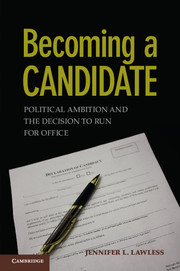Book contents
- Frontmatter
- Contents
- List of Tables
- List of Figures
- Acknowledgments
- 1 Mudslinging, Money-Grubbing, and Mayhem
- 2 The Decision to Run for Office
- 3 Political Ambition in the Candidate Eligibility Pool
- 4 Barack Obama and 18 Million Cracks in the Glass Ceiling
- 5 You Could Be President Someday!
- 6 On-the-Job Training
- 7 You Think I Should Run for Office?
- 8 Biting the Bullet
- 9 Future Patterns of Candidate Emergence and Studies of Political Ambition
- Appendix A The Citizen Political Ambition Panel Study
- Appendix B The First Wave Survey (2001)
- Appendix C The Second Wave Survey (2008)
- Appendix D The First Wave Interview Questionnaire
- Appendix E The Second Wave Interview Questionnaire
- Appendix F Coding of Variables
- Works Cited
- Index
- References
7 - You Think I Should Run for Office?
Political Parties, Political Recruitment, and Political Ambition
Published online by Cambridge University Press: 05 June 2012
- Frontmatter
- Contents
- List of Tables
- List of Figures
- Acknowledgments
- 1 Mudslinging, Money-Grubbing, and Mayhem
- 2 The Decision to Run for Office
- 3 Political Ambition in the Candidate Eligibility Pool
- 4 Barack Obama and 18 Million Cracks in the Glass Ceiling
- 5 You Could Be President Someday!
- 6 On-the-Job Training
- 7 You Think I Should Run for Office?
- 8 Biting the Bullet
- 9 Future Patterns of Candidate Emergence and Studies of Political Ambition
- Appendix A The Citizen Political Ambition Panel Study
- Appendix B The First Wave Survey (2001)
- Appendix C The Second Wave Survey (2008)
- Appendix D The First Wave Interview Questionnaire
- Appendix E The Second Wave Interview Questionnaire
- Appendix F Coding of Variables
- Works Cited
- Index
- References
Summary
In a 2006 op-ed published in the Philadelphia Inquirer, Paul Hackett, who had recently dropped out of a U.S. Senate race in Ohio, reflected on the origins of his candidacy:
When I got back from Iraq last year on March 18th after a seven-month combat tour with the First Marine Division in exotic cities like Ramadi and Fallujah, my wife arranged for a small group of friends and family to meet me at the Cincinnati airport. There, a good friend told me that U.S. Representative Rob Portman [(R–OH)] was about to resign and that I should run for the seat in southwest Ohio where I live and grew up. At first I thought he was kidding.
But as I stood there in my desert utilities, tears running down my cheeks, my wife next to me, one kid on each leg and one in my arms for the first time in almost eight months, I thought of my service in Iraq, and the idea made sense. Service in Congress, as I saw it, would be a natural extension of service to my country in Iraq.
Never before had Hackett considered running for office. But the strong beliefs about policies surrounding terrorism and national security that he acquired while serving in Iraq, coupled with the encouragement he received, propelled Hackett to run as the Democrat in a special election for Ohio's second congressional district. Although he lost the race to Republican Jean Schmidt, Hackett recounted that “the phone kept ringing.” Impressed by his congressional campaign – Hackett had become a “political rock star” – U.S. Senators Harry Reid (D–NV) and Chuck Schumer (D–NY) implored Hackett to challenge Mike DeWine, Ohio's two-term Republican incumbent senator. Told that his country needed him, Hackett viewed the U.S. Senate race as “another opportunity to serve [his] country and [his] party.”
Recruitment by the Democratic Party also paved the way for Tammy Duckworth's decision to run for Congress in 2006. The previous year, U.S. Senator Dick Durbin (D–IL) invited wounded Illinois veterans to the State of the Union address. Duckworth, who had recently lost both legs in combat in Iraq, attended as one of the guests. A few months later, when she earned a promotion to major, she once again found herself face to face with Senator Durbin; Duckworth's new responsibilities involved advocating on behalf of military families and testifying before Congress about military health care. Amid the increasingly unpopular Iraq war, and in an attempt to refute the notion that Democrats were “soft” on national security, the party sought to convince veterans to enter U.S. House races in traditionally Republican districts. So, Senator Durbin targeted Duckworth, who had never before considered a career in elective office. Within two months, Duckworth found herself on the campaign trail, often accompanied by Democratic heavy hitters such as Rahm Emanuel and Barack Obama.
- Type
- Chapter
- Information
- Becoming a CandidatePolitical Ambition and the Decision to Run for Office, pp. 135 - 163Publisher: Cambridge University PressPrint publication year: 2011



